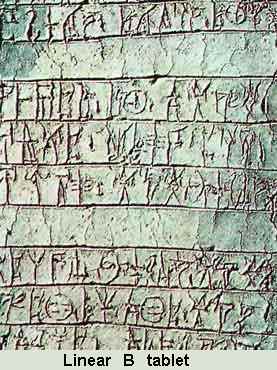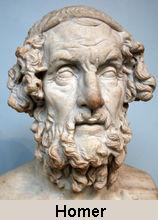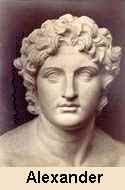Greek Resources
![]()
A short history of the Greek Language
Greek is a living, growing, language. Pronunciation has changed through the centuries, and also varied between different dialects at the same period.

The earliest Greek "alphabet" (strictly, a syllabary) of which we know is that called Linear B, used by the Mycenaeans, ca. 1400 BC.
Linear B, so-called because its letters and words were written in a line, was an adaptation of Linear A, which was used by the Minoans of Crete, ca. 2,200 - 1,400 BC for their language (which does not appear to have been any form of Greek). However, during the time of disturbances generally called the Dorian Invasion, ca. 1,200 - 1,000 BC, it appears that civilisation was so disrupted that the people forgot how to write.
Check out the font for Linear B, and give thanks that the Western alphabet did not develop from that.
In 1952 Linear B was deciphered by Michael Ventris, an architect who was also a linguist, who showed that it represented a very early form of the Greek language.
The alphabet which eventually spread throughout the Western world was developed by Semitic peoples in the Middle East, probably around 1700 - 1500 BC. This Semitic alphabet only had consonants, but no letters to represent vowels. The Phoenicians used a form of this alphabet, and had trading contact with the Greeks, who took the Phoenician alphabet, ca. 950 - 750 BC and adapted it to the Greek language. To do this, they added the letters Upsilon, Phi, Chi, Psi, and Omega, and assigned vowel sounds to some of the letters, thus giving us a true alphabet with a means of representing every sound of the language.
It appears that, in the early stages of the development of the Greek alphabet, there may have been several points of contact between the Phoenicians and the Greek tribes, resulting in several variations of the alphabet.
In the Western version, the Hebrew letters qoph and vav were retained, becoming koppa and digamma in the Greek alphabet, and eventually "Q" and "F" in English. This was the alphabet which spread to the Greek colonies in Italy, then to the Etruscans, the Romans, and into Europe.
In the Eastern version, associated with Ionia (what is now Western Turkey), koppa and digamma were dropped. Eventually this Ionic version was adopted by Athens, and became the Greek alphabet as we now know it.
The Semitic origin of the Alphabet is shown by the names of the original letters - they were initially pictographs, and their names were the names of actual objects. Alef was an ox (head), Beit a house (or tent), Gamal a camel, Daleth a (tent-)door. The Greeks kept the names for the letters, even though they meant nothing in Greek. They have come into English with very little modification.
 Archaic Greek used several letters which had dropped out of use by about the time of Homer (ca. 800 BC), and which are usually omitted from the alphabet.
Archaic Greek used several letters which had dropped out of use by about the time of Homer (ca. 800 BC), and which are usually omitted from the alphabet.
 In 403 BC Athens made Attic the official dialect, and adopted the Greek alphabet as we now have it. Alexander the Great (330 BC) made the Attic dialect the official language of his Empire. Attic was the dialect spoken at Athens, the center of Greek culture at that time, and the home of Aristotle, who was Alexander's teacher. The language continued to develop and change through the years, becoming simpler grammatically (the "dual", used when speaking of a pair of things, dropped out of use), and incorporating vocabulary from other dialects and languages of the Empire. This version of the language was referred to as
κοινη - the koine or "common" Greek.
In 403 BC Athens made Attic the official dialect, and adopted the Greek alphabet as we now have it. Alexander the Great (330 BC) made the Attic dialect the official language of his Empire. Attic was the dialect spoken at Athens, the center of Greek culture at that time, and the home of Aristotle, who was Alexander's teacher. The language continued to develop and change through the years, becoming simpler grammatically (the "dual", used when speaking of a pair of things, dropped out of use), and incorporating vocabulary from other dialects and languages of the Empire. This version of the language was referred to as
κοινη - the koine or "common" Greek.
The Books of the New Testament were written in κοινη, though as they were written mainly by and for people with a Jewish background they contain Hebrew words transliterated into Greek (eg. Amen, Rabbi, Hallelujah), and some of the writers do not keep strictly to conventional grammar (eg. Matthew and John sometimes use a triple augment to make a past tense - the equivalent of saying "he did wented").
The κοινη was predominant during the period 330 BC (Alexander) to AD 330 (Constantine). During the Byzantine period, from AD 330 until the fall of Constantinople (Byzantium) to the Turks in 1453, κοινη was used by the leaders of the Eastern Churches, with centers of scholarship at Alexandria and Constantinople. The system of accents commonly used for modern printed versions of the New Testament was introduced in the 9th century AD. The cursive forms of the letters came into use in the 10th century AD.
After the fall of Constantinople to the Turks in 1453, Greek continued to be used in the Orthodox Church, but the language of the people became corrupted by the incorporation of Turkish words.
With the War of Independence, 1821 - 1832, Greece (though not Ionia) managed to throw off Turkish rule, and began to reconstruct her classical heritage. Attempts were made to "purify" the language, and an official "correct" version, called the katharevousa was imposed in the schools. Katharevousa is now used for government documents and literary work.
Demotic is the normal spoken and written everyday Greek. Demotic tends to have simpler grammar, and fewer case endings. The Dative case has almost dropped out of use - it is now more common to use the Genitive case with a preposition. Also, rough breathings are no longer aspirated. (the equivalent of "I hit him" becoming "I 'it 'im")
In 1982 the Greek government decreed that, instead of a variety of accents, only the acute accent should be used in printed material, and the rough and smooth breathing signs were abolished. This means that modern Greek fonts sometimes do not include the range of letters and accents required for work with ancient versions of the language.
![]()
Copyright © 1999 Shirley J. Rollinson, all Rights Reserved